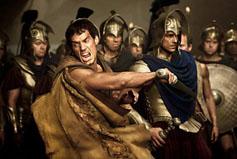
Ancient Greek history and myths have long been a genre of interest in the film industry, mostly because of all the guileless opportunities it provides for studios to pack the soundstages with shirtless hunks and stunning goddesses.
It’s easy to assume from its trailers that Immortals is just another late-comer to the 300 clone party or perhaps even a copycat of the Clash of the Titans remake fiasco, but forget these unfounded assumptions. Immortals is a film with a tone all its own — dark, surreal and ultra-violent. It’s likely the best R-rated action film of the year.
Just the latest in a series of visually stunning works from visionary director Tarsem Singh (The Fall), Immortals’ most enthralling quality is its visuals, with or without the useless 3-D gimmick.
The film has a unique modern flavor to it, from the abstract costumes and set designs to its numerous bizarre transitions. After viewing Immortals — as well as the rest of Singh’s catalogue — it seems as if he’s an art-house director content with his entrapment in a blockbuster world.
This shouldn’t scare viewers away, however. While there are some strange, foreign elements to the film, you simply can’t go wrong with Immortals’ intense physical violence. If you think you’ve seen everything there is to see in an action film, just wait until Apollo is exploding bad guys’ heads all over the walls in one of film’s many eye-candy moments.
The violence in Immortals is extreme, so it’ll probably be best to avoid this if blood isn’t your thing. Aside from exploding heads, there are clear shots of slit throats, amputations and one of the most gruesome geldings ever set to film.
Immortals isn’t all visuals, however. The movie is a smart reimaging of the classic tale of Theseus, played by the next Superman, Henry Cavill (Whatever Works). Instead of recreating his classic tale once again, Immortals imagines a completely different plotline wherein Theseus occasionally waltzes through maligned versions of his myth, Minotaur included (but not really).
Much of the film focuses on the idea that one’s deeds are the actions society will remember, and when we see the stone carving of Theseus’s deeds at the end of the film, we suddenly realize Immortals is the “realistic” version of the events surrounding his myth.
The realism beneath the inherent absurdity of this action extravaganza is also an important concept. Immortals gives us Greek gods — even Zeus (Luke Evans, The Three Musketeers) — who choose to be young and incredibly beautiful instead of old and wise; it shows us the horrors of rape-and-pillage warfare; best of all, it introduces King Hyperion, played by terrifying badass Mickey Rourke (Passion Play).
Immortals is in no way a perfect movie — the pacing is wonky at times, especially in the middle of the film, and every character except Hyperion feels underdeveloped.
Most characters only seem to exist to forward one plot point or another. There’s the guy who cracks jokes (Stephen Dorff, Bucky Larson: Born to Be a Star), the sexy girl who uses the R-rating to its full extent (Freida Pinto, Black Gold) and a certain male character who almost has an interesting emotional arc before suddenly being killed.
The film’s shortcomings are easily overlooked. The action and scenery is eye-popping, the plot doesn’t feel contrived and the movie’s tone is simply unlike anything on the big-screen market right now.
It seems the gods have blessed this one.
VERDICT: Immortals is a visually astounding if somewhat uneven action epic, which works despite its Greek mythology pedigree.
berman@umdbk.com



